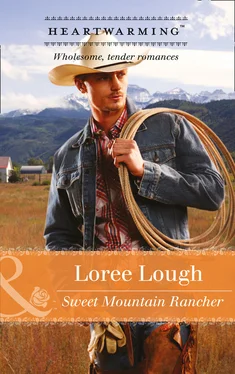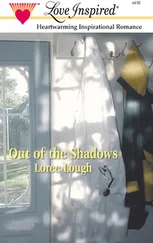“What? I can’t ask you to do that!”
“You’re not asking. I’m offering.” He grinned and, using Joe’s fork, speared a bite of sausage. “I like your boys, so we’ll consider it a donation to Latimer House.”
She could tell that he meant every word, but she couldn’t take his money. Eden never had a problem accepting checks from Cora Michaels and other regular donors. What made Nate’s contribution feel so...different?
“I appreciate the offer, really I do, but I just can’t—”
“Fine. I get it.” He held up a hand, preempting her rejection. “Who knows? Maybe ol’ Joe will do the right thing.”
There was an awful lot riding on that maybe .
That leaky dinghy seemed deeper in the water now, and despite the sunshine on the other side of the windows, she sensed that storm was closing in fast.
* * *
NATE POSITIONED THE Phillips head drill bit into the crosshairs of a loose screw, wincing when it slipped and gouged his left thumb. “Nearly bored a hole clean through it,” he mumbled. “My own fault for letting my mind wander.”
On the other side of the stall gate, Patches bobbed his dark-maned head, as if in agreement.
“Okay, smart guy. I’d like to see how well you’d concentrate with a pretty filly running around in your head.”
The Paint only snorted and went back to munching contentedly from his eye-level hayrack.
“Nobody likes a smart aleck, y’know,” Nate said, moving the tool to the next loose screw in the hinge.
Fellow ranchers had accused him of spoiling his horses. “You treat them nags better’n I treat my wife!” Phil Nicks often joked. But Nate wouldn’t have it any other way. He’d personally drawn up the blueprints for the new barn that housed ten stalls, each with wrought iron gates, rails and yoke openings, swivel grain and water doors, and windows set high enough that the horses could stick their heads out to watch the goings-on outside. An insulating wall-to-wall rubber mattress system covered the floors, and oscillating fans helped circulate the air. Since the flicker of fluorescent bulbs made some of the horses jumpy, he used nothing but incandescents, purchased by the truckload when the government banned them in favor of swirled compact fluorescent, LED and halogen bulbs. Finally, at one end of the barn, he’d installed a wash bay, and across from that, a tack storage cubicle outfitted with saddle and bridle holders and swing-arm blanket racks.
“If ever you take a wife,” Phil had said at the last hoedown, “you’d better keep her out of this place, or she’ll expect the same kind of pamperin’!”
“Take a wife?” Nate’s dad countered. “How’s that supposed to happen when this son of mine hasn’t said yes to a woman in years?”
“Hasn’t said yes to much of anything in years!” his mom added.
They’d been right, and Nate still hadn’t figured out if his Just Say No policy was a good thing or a bad thing.
Instantly, Eden’s pretty face came to mind. Eden, who earned the respect of boys big enough to snap her like a twig, though none seemed to have a mind to. Nate admired her, too, for all she’d accomplished with her charges and for what she’d sacrificed to guarantee them a stable home and a secure future. He hoped the boys were mature enough to realize how fortunate they were to have her in their corner.
When he’d overheard her tell Joe what the state paid to keep Latimer House functioning, he’d nearly choked on his coffee. With such a paltry amount, how did they expect her to do more than pay the rent and keep the lights on? It didn’t take a genius to figure out that using her own money was the only way to afford gas for the van, food and clothing for growing boys, and something other than the TV to keep them entertained and occupied.
A good thing or a bad thing? he wondered again.
She’d looked sad, scared and humiliated when he’d offered to front the cash for repairs at her grandparents’ place. For the past two years, he’d lived by two simple rules: “do unto others,” and his own “just say no.” How weird, he thought, that by following one, he’d violated the other. Least he could do was give her a call and apologize for putting her on the spot.
He was about to dial her number when his foreman’s name appeared on the screen.
“Hey, Carl,” he said, picking up. “What’s up?”
“Found another one of your dad’s horses out in the south pasture. I sent Ivan and Seth out there to pick up the carcass. No sense encouraging more of the same.”
“Good thinking.” Nate ran a hand through his hair, wondering which horse it had been and how to break the news to his father. “What do you reckon, bear or cougar?”
“Cougar, most likely. Bear would have left a far bigger mess.”
Carl was right. Bears were greedy, sloppy assassins that often began feeding before their quarry was dead. Cats, even when near-starved, preferred to kill with a bite to the back of the neck. And because the opportunistic felines didn’t like feeding out in the open, they tended to drag uneaten carcasses as far as possible from the kill site and cover them with grass, pine needles or dirt, preserving the meat for a future meal and reducing the chance that another predator might sniff it out and steal it.
“My guess is this cat was forced into new territory by a bigger, better fighter,” Carl said.
“Either that,” Nate said, “or those so-called animal experts captured and tried to relocate it, and now it’s scoping out new hunting ground.”
“Well, we got plenty of pictures, in case Colorado Parks and Wildlife demands proof if we have to take drastic measures.”
“Good, good,” Nate said. “You boys keep your wits about you and rifles and sidearms at the ready, you hear?”
“Don’t worry, boss. We’re like that credit card company—‘Never leave the bunkhouse without ’em.’”
Конец ознакомительного фрагмента.
Текст предоставлен ООО «ЛитРес».
Прочитайте эту книгу целиком, купив полную легальную версию на ЛитРес.
Безопасно оплатить книгу можно банковской картой Visa, MasterCard, Maestro, со счета мобильного телефона, с платежного терминала, в салоне МТС или Связной, через PayPal, WebMoney, Яндекс.Деньги, QIWI Кошелек, бонусными картами или другим удобным Вам способом.












